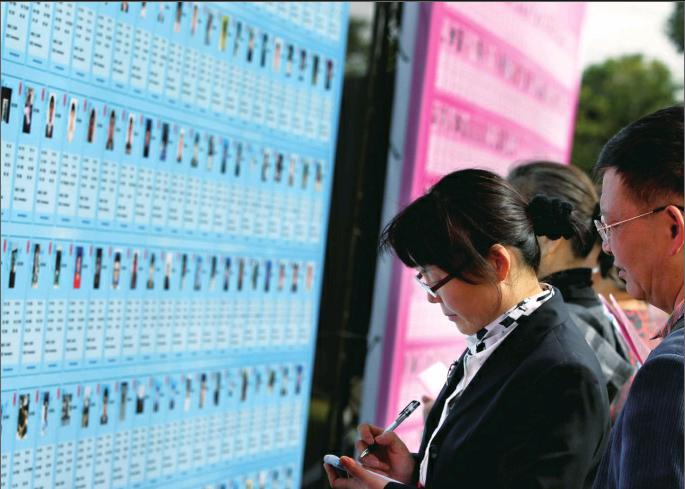The Single Life
2016-02-16ByYuanYuan
By+Yuan+Yuan

Every morning 54-year-old Qi Guilan goes to a pavilion in the Purple Bamboo Park in west Beijings Haidian District with her daughters profile written on palm-sized paper. She pastes the paper on a small wood board and sits in the pavilion with the sign beside her. Normally, there are about 10 people of Qis age who gather at the pavilion with profiles of their children. On weekends, there are more.
They form part of a growing phenomenon—parents hoping to find a spouse for their unmarried children.
Qis daughter, 30, just returned to China from the United States with a masters degree and works for a state-owned company in Beijing. “I came across this pavilion while doing morning exercises in the park,” Qi told Beijing Review. “It is a good find as I have long been worried about the marriage of my daughter: it is a priority for my family.”
After one week, Qi made friends with all the parents here and they shared their experiences of seeking for spouses for their single children.“I learned through chatting with these parents that it is difficult for a single woman to find her Mr. Right in Beijing,” Qi said. “A mom came here when her daughter is only 24. Compared to her, my daughter is too old, so we must hurry up.”
Common situation
This is a familiar scene throughout many parks in metropolitan areas across China. The Peoples Park in Shanghai is famous for its match-making fair and holds match-making parties regularly. Every weekend, more than 500 parents gather and exchange their childrens profiles with one another.
A 27-year-old Shanghai woman surnamed Ma, who would not reveal her full name, told Beijing Review that her mother is a regular visitor to the fair. “I have been told innumerable times since I was 25 that I need to get married as soon as possible,” she said. “I was dragged to some match-making parties with no results. Then my mom thought she should take action on her own.”
The match-making fair, in Mas eyes, is like a real market. Every marriage-seeker is tagged with a price. She said that her mother wants her candidate-husband to also have been born in Shanghai, as well as own an apartment and car along with an annual salary of no less than 300,000 yuan ($45,780).
“My mom told me that after I turn 27, I would have little opportunity to find an ideal husband,” Ma said. “I have been asked to grab every opportunity to get married before reaching the age.”
The match-making fair in the Peoples Park was formed in 2005 when several retired officials thought up the idea as a way to help the citys unmarried young people. “Its popularity reflects the growing number of so-called ‘leftover young men and women in Shanghai,”wrote Chen Yaya, an assistant researcher at the Institute of Literature under the Shanghai Academy of Social Sciences, in an article “Living Conditions of Urban Single Women.”
Left-over women—an expression for single women over 27, is a term coined in the late 2000s. “This word denotes a strong prejudice against women,” wrote Leta Hong Fincher, an American doctoral candidate in sociology at Tsinghua University in her book Leftover Women: The Resurgence of Gender Inequality in China. “It is more like a scheme played by the media in order to put women under pressure to get married soon, even though there are more single men than women in China.”
Census data from the National Bureau of Statistics reveal that at the end of 2014, there were 700.79 million males in China, 3.38 million more than that of females. The ratio of unmarried people born after 1980 is 136 males to 100 females.
While women find it difficult to find a spouse in big cities, the picture in rural areas is the opposite—men are the ones who have trouble. Li Jianguo, a man born in 1988 in a village in Handan, north Chinas Hebei Province, started his match-making “career” at the age of 19. “At that time, I was dreaming of finding a pretty, diligent and educated girl,” Li told China Youth Daily.
He didnt find his ideal wife and one year later, Li went out of the village to work in cities. After four years, he was “dragged” back to the village by his parents. “The situation was quite severe, they told me, as it was super difficult to find a wife in the village,” Li said. It was true. Li spent the following three years in match-making meetings and didnt make any progress.
Guo Wei, a 25-year-old man from another village in Handan, experienced the same matchmaking frustration. “Even a divorced woman would be an ideal match for quite a few single men,” he sighed.
The price of marriage
The price of marriage is rising no matter where people live. Xing Weiguo, a migrant worker in Beijing told Beijing Review that in his home village in Anyang, central Chinas Henan Province, a single man has to prepare at least 200,000 yuan ($30,520) in cash for marriage as well as obtain a house. Increasingly, more women are demanding an apartment in cities instead of a house outside of urban areas, which has laid more pressure on single men.
In metropolitan areas like Beijing and Shanghai, to own an apartment is a “must” for many young people to tie the knot. “My mom is very firm on this, even though she keeps reminding me how old I am, she wont let me date anyone without an apartment in Shanghai,” Ma said.
Considering the rising housing prices in Chinese megacities, it is unrealistic for most men to buy an apartment on their own by the age of 30; many can only do this with the financial help of parents.
“China is experiencing its fourth wave of singles since 1949,” said Chen Yaya, making her comments based on the Survey on the Living Conditions of Urban Single Women, presented at the Chinese Social Harmonious Family Forum and the Ninth National Family Issue Symposium in Guangzhou, Guangdong Province, in July 2015.
She explained in a paper based on the survey that the countrys first singleton tide happened in the 1950s, in the rash of divorces after promulgation of Chinas first Marriage Law. The second was in the late 1970s, when swathes of young people who had been sent to the coun- tryside in the late 1960s and early 1970s for education through manual labor divorced their rural spouses in order to return to their urban homes. In the 1990s, the third mass avoidance of marriage was attributed to “changes in traditional outlook of values” amid social transitions.
“The first three singleton tides were temporary and driven by the objective situation,” Chen wrote.“That women are consciously deciding not to marry is what distinguishes the fourth tide.”
Lu Xiaoguo, a 33-year-old manager of a foreign-funded company in Beijing, earns 500,000 yuan ($76,300) a year and never plans to buy an apartment or get married to her boyfriend. “I dont like the feeling of settling down and limiting myself to an apartment-sized space,” Lu told Beijing Review, “Not to mention giving birth to children, who I think would put my life into a deadlock.”
Lu spends her vacations traveling and has been to most of the countries in the world.“There are many lifestyles in the world and getting married is just one.”
